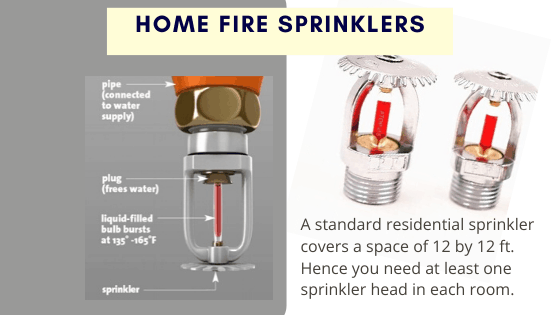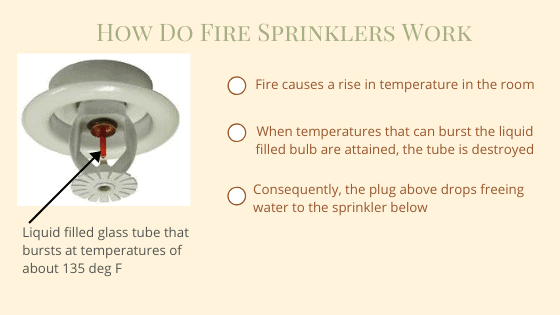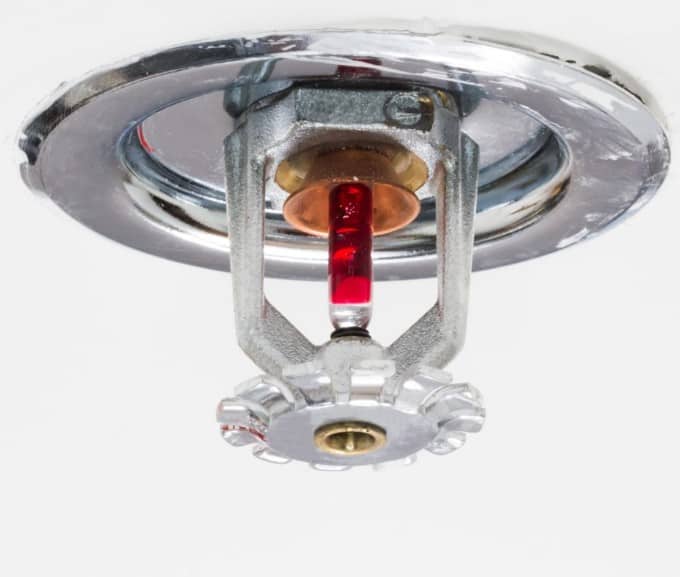A residential sprinkler system may not necessarily be required for all structures and buildings around the United States. However, there is no denying that they can be advantageous. They easily add a layer of protection to a property. Hence it would always be a great idea to have it installed.

As they say, many would covet to have this system on their properties but no one should need it.
Are you thinking of setting up a home sprinkler system in your residential property? If your answer is yes, then one of the things that you need to know is how many sprinkler heads you require to install. This might sound like a very complicated question but we will try to make it relatively straightforward in this article.
Contents
Benefits of Residential Fire Sprinkler Heads
Let us first look at the purpose of these systems. Fire alarm sprinkler systems are designed to control the initial outbreak of fire. To the end that the fire won’t get bigger and cause severe damage to your property. To clarify, residential sprinklers are not meant to put out a raging fire. Obviously they shouldn’t have to if they function accordingly.
You see, a good sprinkler system would go off as soon as its sensors felt a significant increase in temperature. Sprinkler heads are designed to go off individually when they detect temperatures of 135° Fahrenheit and beyond. After which, it will release water from its pipes.
In many cases of residential fires, one sprinkler head did the trick. Hence many residential fires are usually controlled with one operating sprinkler head.
This shouldn’t be too surprising since most residential fires originate in just one area of the home. For example, the kitchen or the garage. Most sprinklers can cover spaces that measure 12’ x 12’ but you can also find ones with extended coverage that can cover 20’ x 20’.
And since it’s recommended that sprinklers should at least be 8 feet apart, most homes only really need 1 sprinkler head per room. With this amount of coverage, if a small fire gets detected by the sprinkler system early on, (as they should), it can be put out by the sprinkler head’s water release effectively and right away.
Important Points to Keep in Mind about Residential Sprinkler System
How does a sprinkler system work?

You might be feeling a bit confused about water sprinklers and that’s alright. So, here are a few additional points that you should know to help you better understand how many sprinkler heads you need to install in your home:
It does not make all sprinkler heads go off when it detects a problem.
As mentioned earlier, sprinkler heads are activated individually and not as a collective system. Their sensors are separated so a small fire in the kitchen will not trigger the activation of all of your sprinkler heads all over your home.
So if you’re worried that the fire in the kitchen will get all of your stuff soaked, you got it wrong. The activation of sprinkler heads are localized to better respond to the home’s needs.
It’s best to get fire sprinkler heads with various heat ratings.
Different sprinkler heads have varying heat ratings so buyers have the option to match their ceiling’s maximum expected ceiling temperature.
Since different areas of your house can have different heat levels all throughout the day, it would be ideal to get sprinkler heads with different heat ratings. This will ensure that they’ll be able to respond accordingly to the heat changes in their surroundings.
It’s required that you have spare sprinkler heads on hand if you have water sprinklers installed.

According to the NFPA (National Fire Protection Association), every property with a sprinkler system installed needs to have spare sprinkler heads on hand. As per the NFPA 13 (2010 6.2.9), there should be at least 6 spare sprinkler heads available on the premises of a property with water sprinklers.
The bigger the system is, however, the more spares are necessary. This is so damaged or malfunctioning heads can be replaced promptly.
For residential homes, the NFPA has detailed guidelines for the installation of residential fire water sprinkler systems. The NFPA 13 provides the information you need to ensure that your home’s sprinkler system is adequate and meets the minimal requirements of the agency.
What Next?
Installing a fire sprinklers system for your home may not be required where you live but it has many benefits. Not only will you be able to provide protection to your property but some cities may also award concessions and perks for those who wish to install one to their new homes.
Take it into close consideration as it can also be well worth the investment.